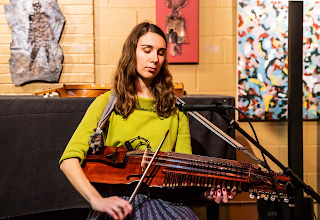Who Cares If I Play Swedish Music?
Nyckelharpa played the traditional Swedish way, with the strap over the neck
Photo: Aaron Winton
NB! Huom! The title of this post is a playful reference to the famous Milton Babbit essay "Who Cares if you Listen?" It is not meant in any way to be disrespectful of Sweden's national instrument the nyckelharpa, but to explore the versatility of this beautiful instrument and deconstruct social bias.
Recently, I have been thinking about what it means to be a non-Swedish heritage nyckelharpa player and the history of the nyckelharpa and what the nyckelharpa has come to represent. I get the question a lot: Are you Swedish? I say no, I'm Puerto Rican (to laughter). [Edit: I recently found out I am about 1% Swedish]. Then why do you play Swedish nyckelharpa? And I always want to ask, well, are you Italian if you play violin? Why has the nyckelharpa come to represent Swedish identity? Yes, it is Sweden's national instrument, but...
I supposed the Romantic nationalism movement that swept through 19th-20th century Europe is to fault. Just like Jean Sibelius became associated with Finnish-ness and is a source of pride for many, the Swedish nyckelharpa, developed and popularized by Eric Sahlström in 1930, became linked with Swedish national identity. The fact is, though, the predecessors of the modern chromatic nyckelharpa were found all over Europe, and even in Sweden was predominantly found only in Uppland in Sweden, a region northwest of Stockholm. How does an instrument modernized so recently carry such Swedish connotations? Who owns culture and its associated instruments?
Studying nyckelharpa at the Sibelius Academy in Finland has been very interesting. People frequently ask me: why aren't you studying in Sweden? What music do you play on nyckelharpa? Have you studied in Sweden? People like to categorize into boxes, which is fine until it is limiting. Why should I only play Swedish music on this instrument? Isn't it an instrument like any other, with limitless possibilities? I have been enjoying playing Finnish archaic music, old music without a beginning or end full of endless improvisation. I also write my own music and like to improvise on nyckelharpa. Recently, I was assigned to practice some Bach from the violin partitas. Maybe next I can play some Hildegard von Bingen, or Philip Glass. Why not embrace the endless creative possibilities of a beautiful instrument?




Comments
Post a Comment